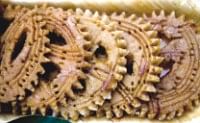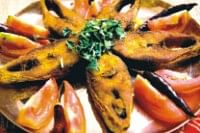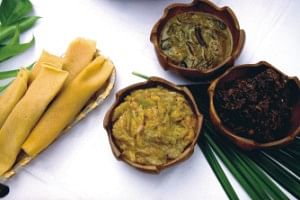| Home - Back Issues - The Team - Contact Us |
 |
| Volume 10 |Issue 13 | April 01, 2011 | |
|
|
Reflections Village Food Andrew Eagle
I faced the days of May without a fan that year, 1999, living in a tin house transformed into a mini-furnace by the season. I'd wake drenched in sweat and as soon as possible pull up a chair under a tree. Inside was hotter. There wasn't the joy of the pond in that stifling pre-monsoon month when water levels are low; the water a dubious freshness. Most days there wasn't even in the air the slightest stirring. Now too, post-solar, barring the handheld pencil-battery-powered variety, you won't find an electric fan in Hatiyan village households, and May punches still, with all its brawn. There were not infrequent, not common bouts of diarrhoea as my stomach became Bengali-tough, and usually some measure of skin irritation going on. Worst were the food problems: Hatiyans eat rough red rice and all manner of fish; and while I realise it's close to criminal non-activity in Bangladesh, especially along the shores of the Bay, I must confess I don't eat fish. I tried. Red rice three times a day, fish small and bony, larger and fleshy, it was like that at first, the typical village diet. The fish kept coming and I started getting thinner. Bangladeshis always think it's the chilli that's the issue. This is not a list of complaints. I'm trying to explain how my endurance was being tested. For a Sydneysider to live in a Hatiyan village independently was physically tough; but I suppose I had something far greater than whatever support some random aid project could've provided, for I had Situ's friendship. We'd met in Khulna in 1996. Leaving Bangladesh after three weeks on that first trip, I can't say why but I was so heavy with regret, my mind so weighted in the certainty Bangladesh held importance and remained unfinished, that it's surprising the bus tyres hadn't burst as it rumbled towards the Benapole border.
Back in Sydney, to treat my Bangladesh de-tox., there was not much to do; but I wrote letters, and I wrote a research paper on Bangladeshi Labour Migration. When university was done, and I'd completed another two trips to Bangladesh in the interim, I knew I'd live here for a while. I wanted to know about Bengali culture; more of the place that had so much to teach. For six months I'd been gradually saving pennies in vague preparation; the event wasn't entirely spontaneous. I'd taken a job at the Department of Immigration, my second job, and had been there just a month. Then one day, my first waking thought was: it's time. There was no denying it. I resigned that morning, giving the two weeks' notice. I booked a flight and organised a visa. There was shopping to be done: gifts to take. All the preparations I could manage but one: I couldn't tell Situ I was coming. There was no international phone line to Hatiya in those days; to send a letter took a month. After exactly two weeks I was on the plane. It's not that I had the slightest doubt he would agree to the staying a year, which was the plan; nor would his family. There was absolutely no chance of it. I arrived in Dhaka, struggled out of the airport with my luggage. I took a taxi to the bus station, found the Noakhali service; four plus hours later I got down, somehow ended up on a local bus that took what seemed forever to reach the Number Four Ghat, and I'd had to travel the last part by rickshaw. Luckily I was in time for the sea truck to cross the river, and after three hours I reached Hatiya, organising a baby taxi to take me down the island, the last hour. The baby taxi pulled up on the main road some hundred metres or so from Situ's house, which fronts a smaller road. It was evening; it was dark. The house was difficult to recognise. I'd been there but six months before, and it wasn't the house that'd changed but the landscape. The green of monsoon had been replaced by the yellow and brown of winter's palette, and two large bails of rice-hay hid the house from view. Iman Ali: he was witness to it, my arrival, though I didn't know him yet.
Outside the house I called Situ's name a few times. In later years I was more inclined to call out 'musafir' or traveller, the way wanderers used to do in Hatiya in the old days when they sought alms or were begging; but I didn't know that yet. After some moments Situ came out of the house already on his way into a state of complete shock. He'd recognised my voice, and stood staring in utter disbelief, for several minutes. 'Is it really you?' I'm afraid it was. How many villagers wasted muscle-power that May, twirling those thatched hand fans to add a little breeze to the room, I couldn't account them. I remember my brothers Choton and Komol doing it a lot. When it came to ailments, there was always my Bengali mother or one of the many bhabis or sisters-in-law to nurse me well. As for food, it underwent a kind of evolution: a succession of new dishes prepared and tested until I became acquainted with the full range. It was unfortunate that chicken korma came late. Situ used to leave at dawn for the main town, many days, to find out if they were planning to slaughter a cow, such that I could eat beef. There were no mobile phones then. As for chickens, of the small-boned extra-tasty deshi or native variety, Situ reckoned I'd single-handedly accounted for half the island's flock. My mother tried what she called Bihari dal, more solid than the usual Bengali preparation. And of course, I'll never forget how many families around the village became involved. In the tea shops there were lengthy discussions about my diet. 'Don't worry about breakfast tomorrow,' some friend would say, translated by Situ, and I'm recalling Alauddin when I write that, 'my wife said she'd make it.' That's how the pitha or local cakes were discovered as a breakfast staple, along with a glass of milk from one of the various bovine-owning neighbours. I think maybe Emran most often used to deliver the chicken's eggs; duck eggs I wasn't allowed as they made the skin itch. In the bazaar Nashir used to grab my arm and pull me to the tea shop that specialised in piazu, or onion rings; he will still do that. I remember the soft type of pitha wrapped in bamboo leaves that Leku's wife made; and ten months later, when I was leaving, Leku, who even then was seemed sixty, complained to Situ, 'if it wasn't for the food he could stay forever.' There was no politeness in it. It's rather shameful to have had such a pretentious stomach. Now Hatiya offers feasts of pulao and biryani rice on special occasions, noodles, delicious doi yoghurt, fresh fruit and vegetables, eggs, duck, pithas and Bihari dal à la mother's recipe. But in those days I got progressively thinner, my appetite dissolved. When I returned to Sydney I was so thin my friends worried. Hatiya challenged everything. When I'd found myself giving and receiving 'assalamu alaikums' and 'namaskars' all along the road I found community. When there was so much to learn I found I didn't care about May, the skin problems or the odd diarrhoea bout. Even the stomach lost relevance in those, the best of all days.
Copyright (R) thedailystar.net 2010 |


